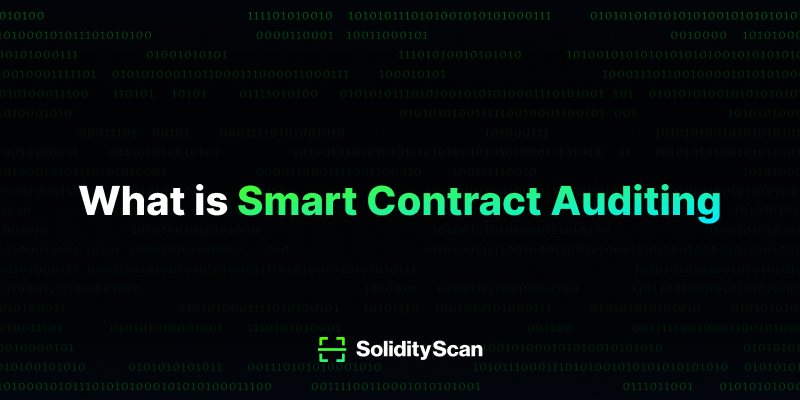
In recent years, the world has witnessed a surge in the popularity of blockchain technology. With the introduction of smart contracts, the blockchain has become more than just a platform for cryptocurrency transactions. Smart contracts are self-executing contracts with the terms of the agreement between buyer and seller being directly written into lines of code. They allow for the automation of complex transactions, and the potential benefits of this technology are immense. However, as with any code, there is always the risk of vulnerabilities, errors, and bugs. That is where smart contract auditing comes in. In this article, we will discuss what smart contract auditing is, why it is important, and how it can help prevent costly errors.
Smart contract auditing is the process of analysing smart contract code to identify any potential vulnerabilities or weaknesses that malicious actors could exploit. The goal of a smart contract audit is to ensure that the code is secure, reliable, and operates as intended. This is achieved through a comprehensive review of the code, including the identification of potential bugs, errors, and security vulnerabilities.
Why is Smart Contract Auditing Important?
Smart contract auditing is essential for ensuring the integrity of the code and protecting the parties involved in a transaction. If a smart contract contains vulnerabilities or errors, it can result in financial losses, reputation damage, or even legal consequences. Smart contract auditing can help prevent these scenarios by identifying and addressing any issues before the contract is deployed.
In addition to ensuring the security of the code, smart contract auditing can also improve the efficiency of the contract. By identifying potential bugs and errors, the contract can be optimised to run more smoothly and reliably.
How Smart Contract Auditing Works?
The smart contract auditing process involves a thorough review of the code by a team of experienced auditors. The team will typically consist of developers, security experts, and legal professionals who have experience with smart contract technology.
The audit begins with a review of the contract’s specifications and requirements. The team will then conduct a manual review of the code to identify potential bugs, errors, and vulnerabilities. They will also use automated testing tools to identify any issues that may have been missed during the manual review.
Once the audit is complete, the team will compile a report that outlines any issues that were identified during the audit. The report will include recommendations for how to address these issues, and the contract will need to be modified accordingly.
Manual Vs Automated Auditing
So here is the thing, Machines will never replace humans but the human who knows how to run machines will. So Manual auditing is any day a good thing but automated tools like SolidityScan does provide support and makes the work more fast and easy so the auditors only have to fix the bugs.
But we also have some pros and cons as well like
- Thorough: Manual auditing is more comprehensive than automated auditing since it involves human expertise. Human auditors can identify vulnerabilities and errors that automated tools may miss.
- Flexibility: Manual auditing allows auditors to customise their approach and focus on specific areas of the smart contract that may require more attention.
- Expertise: Manual auditing requires expert knowledge of smart contract coding, which ensures that the audit is conducted by someone with the necessary skills and experience.
Cons of Manual Auditing
- Time-consuming: Manual auditing is time-consuming since it involves line-by-line code analysis. This can delay the launch of a smart contract, which may not be ideal for time-sensitive projects.
- Cost: Manual auditing can be expensive since it requires expert human resources. Small-scale projects may not have the budget to hire a manual auditor.
Pros of Automated Auditing
- Speed: Automated auditing is faster than manual auditing since the software can analyse the code within a short time.
- Cost-effective: Automated auditing is less expensive than manual auditing since it does not require expert human resources.
- Consistency: Automated auditing is consistent since the software uses predefined rules to identify vulnerabilities, which
Cons of Automated Auditing
- Limited scope: Automated auditing tools may not identify all potential vulnerabilities, especially those that require a deeper understanding of the smart contract’s logic.
- False positives: Automated auditing tools may generate false positives, highlighting potential vulnerabilities that are not actually present in the code.
- Lack of customisation: Automated auditing tools may not be customisable to focus on specific areas of the smart contract that require more attention.
- Limited expertise: Automated auditing tools are only as good as the algorithms they use, and may not have the same level of expertise as human auditors.
Conclusion
Smart contract auditing is an essential part of the development process for any blockchain-based project. It ensures the integrity of the code and protects the parties involved in a transaction from potential vulnerabilities and errors. By identifying and addressing these issues before the contract is deployed, It can also save time, and money, and prevent legal consequences.
We understand the importance of smart contract auditing and offer a comprehensive range of auditing services. Our team of experienced auditors can help ensure the security and efficiency of your smart contract code. Contact us today to learn more about our auditing services and how we can help you protect your blockchain-based project.
